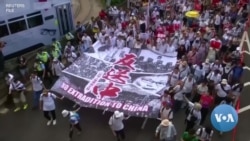Looking back at 25 years since Britain handed Hong Kong over to China.
Welcome to VOA Asia Weekly. I'm Chris Casquejo in Washington. That story just ahead, but first, making headlines…
U.S. Secretary of State Antony Blinken left for Asia for a meeting of G20 foreign ministers in Bali, Indonesia. Russia's attendance is a point of contention as host Indonesia tries to mediate.
China’s Vice Premier Liu He and U.S. Treasury Secretary Janet Yellen held a virtual meeting on the global economy. President Biden says he’s considering lifting some tariffs on China.
24 new COVID cases have led to another round of testing in Shanghai, spurring fears of another round of lockdown in the Chinese economic powerhouse.
Following his inauguration, New Philippines President Ferdinand Marcos Jr. met Chinese Foreign Minister Wang Yi to discuss territory disputes within the South China Sea.
Russian Foreign Minister Sergey Lavrov visited Vietnam, a key Cold War ally, to celebrate “comprehensive strategic partnership." Hanoi has refrained from criticizing Russia’s invasion of Ukraine.
The U.S.-led Rim of the Pacific, or RIMPAC, military exercises are underway with six ASEAN militaries and the Pacific Island nation Tonga among the 26 nations participating.
Chinese President Xi Jinping told Hong Kongers that the territory must be governed “only by patriots.” Xi made the statement while visiting the city to mark the 25th anniversary of its handover from Britain to China on July 1st.
With great fanfare in 1997, Hong Kong began a new chapter in its history with a promise from China: To essentially leave the city alone for 50 years under a principle called “one country, two systems.”
“Fairly early on there were signs that the supposed high degree of autonomy that Hong Kong would enjoy was not going to be preserved.”
Some signs: In 2003, over half a million people took to the streets against a proposed security law that rights groups said threatened basic freedoms. It was shelved.
In 2014, China issued a policy document underscoring China's sovereignty and ultimate authority over the city. That August, China's parliament ruled Hong Kong could have a direct vote for its leader in 2017, but only for candidates endorsed by a pro-Beijing vetting committee. In September 2014, thousands of protesters thronged key roads, prompting police to fire tear gas. The "Umbrella Revolution" - named after the use of umbrellas to block police weapons - occupied roads in three major districts for 79 days, before being cleared by police.
Beijing granted none of the protesters' demands, including universal suffrage.
In 2019, millions opposed a bill that would have allowed people accused of certain crimes to be sent to China for trial. Peaceful protests snowballed into a populist movement against Chinese authoritarian rule.
Analysts say the 2020 National Security Law was the point of no return.
“It effectively created a whole new judicial system inside Hong Kong involving mainland authorities and brought in mainland authorities to handle security inside Hong Kong.”
Under the NSL, authorities raided media outlets and civil society groups, many now shut down, and held key democratic politicians and activists without bail. More than 2,000 people have been jailed for offenses linked to the 2019 protests. And on the 25th handover anniversary, no visible demonstrations of dissent.
“This is a city that is no longer recognizable. Even five years ago, you would expect that July 1st - the march, actually it was a day of protest."
25 years after the handover, one thing is clear: China’s grip is not loosening. And for many Hong Kongers, promises made were not promises kept.
Visit our website voanews.com for the most up-to-date stories. You’re watching VOA Asia Weekly.
Fears of foot and mouth disease have dampened cattle sales in Indonesia ahead of the Eid-al-Adha festival. According to Agriculture Ministry data, more than 317,000 animals have been infected in 21 Indonesian provinces, largely on the most populated islands of Java and Bali.
Finally on VOA Asia Weekly, hundreds of Buddhist monks and devotees gathered in the northern Indian town of Dharamsala to celebrate the Dalai Lama’s 87th birthday.
Hollywood star Richard Gere helped cut the Tibetan spiritual leader-in-exile’s birthday cake.
The Dalai Lama fled to India in 1959 after a failed rebellion against Chinese rule. Since then, he has been advocating for what he calls genuine autonomy for the Tibetan people.
Thanks for watching VOA Asia Weekly. I’m Chris Casquejo. Tune in again next week.











